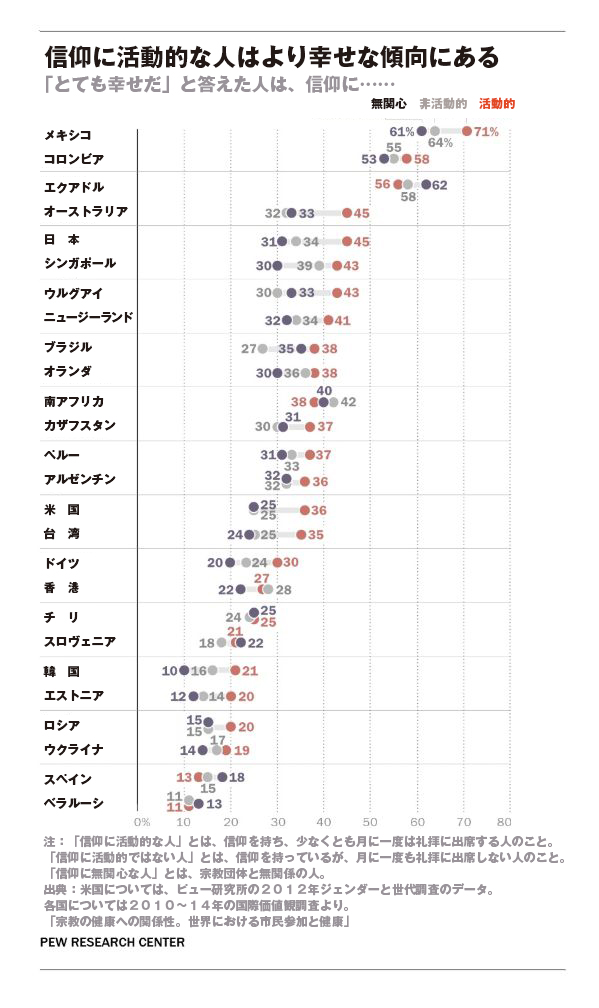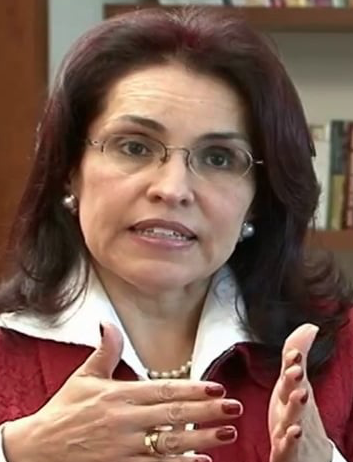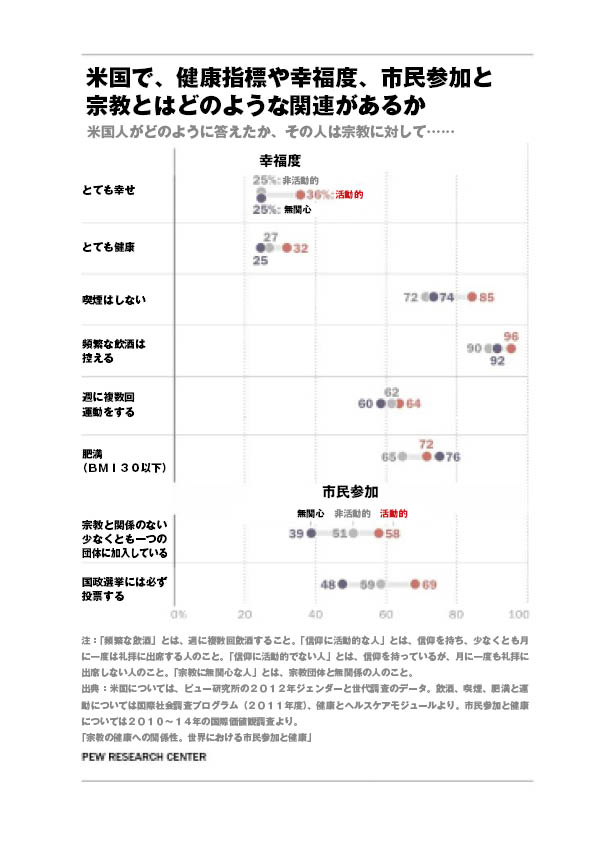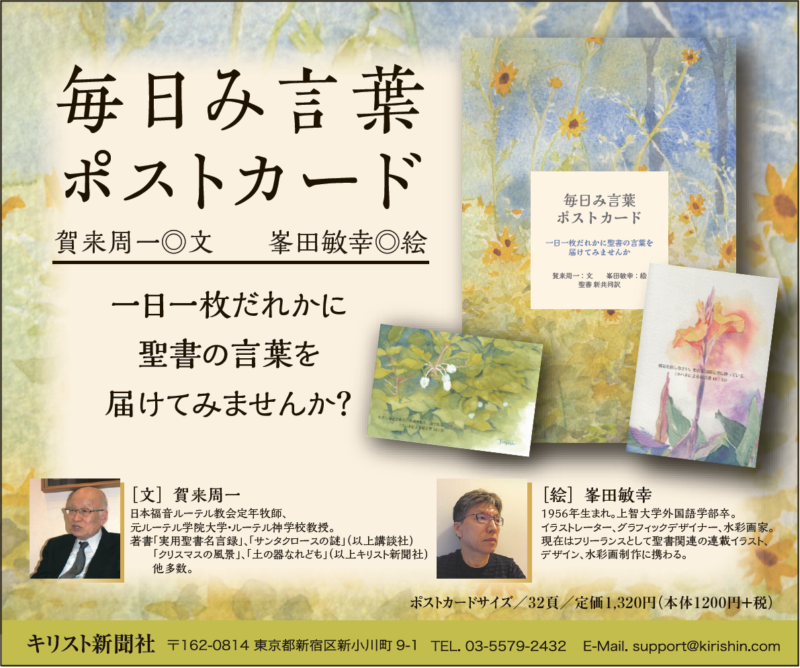今回の報告で、24カ国のうち、メキシコ、コロンビア、エクアドルという中南米3カ国が最も多くの点でランキングされた。それらの国では、教会に通う人も、宗教に無関心な人も、その大部分が「とても幸せだ」と答えた。これは米国やドイツの2倍、スペインやロシアの3倍となる。
The three Latin American countries ranked the most content among 24 nations surveyed in the Pew report. In Mexico, Colombia, and Ecuador, a majority of both churchgoers and religious nones identified as “very happy,” double as many as in the US or Germany and triple as many as Spain or Russia.

首位のメキシコで「とても幸せだ」と答えたのは、信仰に活動的でない人は64%、宗教に無関心な人は61%だが、宗教に活動的な人は71%だった。その大多数はカトリックだ。メキシコは、殺人事件の発生率の上昇に直面し、昨年は麻薬カルテルとの衝突がより致命的となったことで、過去最高を記録した。
In the No. 1 country, Mexico, 71 percent of actively religious adults were very happy—the vast majority being Catholic—compared to 64 percent of those who weren’t active in their faith and 61 percent of the unaffiliated. Yet, Mexico has faced climbing murder rates, which reached a record-high last year as clashes with drug cartels grew more deadly.
コロンビアで「とても幸せだ」と答えたのは、信仰に活動的でない人の55%、無関心な人の53%に対して、信仰に活動的な人が58%だった。政府と反政府ゲリラ組織「コロンビア革命軍」(FARC)との和平合意から数年経つが、この国では暴力団による犯罪やゲリラの攻撃、麻薬の密売、汚職が後を絶たない。
In Colombia, 58 percent of actively religious adults were very happy, compared to 55 percent of inactive members and 53 percent of those with no religious affiliation. Even a few years after a peace agreement between the government and the FARC (Revolutionary Armed Forces of Colombia), the country continues to suffer gang violence, guerrilla attacks, drug trafficking, and corruption.

ヴィヴィアン・モラレス氏(写真:Hechos & Crónicas)
昨年、コロンビア大統領に立候補したクリスチャンのヴィヴィアン・モラレス氏はこう述べる。「コロンビアは混乱のさなかで、モラルは緊急事態にあり、その価値観を正す必要があります」。そして、赦(ゆる)しと和解の立場を強調しつつ、「政治勢力が教会を操作するために国家を分断することを許すわけにはいきません」と言う。
“Colombia is almost in chaos, in a moral state of emergency, and needs to get its values in order,” Viviane Morales, an evangelical politician who ran for president last year, told CT. Urging a position of forgiveness and reconciliation, she said, “We cannot allow political forces dividing the country to manipulate the church.”
幸福度と信仰との相関関係に影響するいくつかの要素を研究者は示唆する。信仰を持つ人のほうが幸せなのは、宗教的共同体に関わっているからかもしれないし、彼らが喜んでそうした関わりを持つのは、彼らがすでに幸せだからかもしれない。
Researchers suggested several factors contributing to the correlation between happiness and active faith; religious folks may be happier because they are more involved in their religious community, or they may be more willing to get involved since they’re happier already.
宗教に活動的な人は、生活のほかの分野でも多くの関わりを持っている。彼らは市民参加にも時間をついやす。
Religiously active adults were also more likely to be “joiners” in other areas of life—they dedicate more time to civic involvement.
コロンビアでは、規則正しく礼拝に出席するのは、大多数のカトリック信者よりもプロテスタントのほうが多いが、「教会外のコミュニティーにも参加している」と答えたのは、宗教に無関心な人は39%、宗教に活動的でない人は38%に対して、きちんと礼拝に出席している人は42%だった。同様に、メキシコで教会外の組織に加入しているのは、宗教に無関心な人が36%、宗教に活動的でない人が35%に対して、宗教に活動的な人は41%だ。
In Colombia, where Protestants are more likely than the Catholic majority to attend services regularly, 42 percent of active worshipers said they participate in a community organization outside their church, compared to 39 percent of the religiously unaffiliated and 38 percent of inactive believers. Similarly, 41 percent of religiously active Mexicans belong to other organizations, compared to 36 percent of the religiously unaffiliated and 35 percent of inactives.
このギャップは、米国ではわずかに大きくなる。慈善活動やスポーツ、労働者団体に関わっているのは、宗教に活動的な人が58%、活動的でない人は51%、無関心な人は39%にとどまる。
The gap is slightly larger in the US, where 58 percent of the actively religious are involved in charity, sports, or labor groups, versus 51 percent of inactive members and 39 percent of the unaffiliated.

市民参加の相関関係は、投票行動にも適用できる。
The civic participation correlation also applies to voting.
ピュー研究所によると、国政選挙に必ず投票すると答えたのは、宗教に活動的な米国人で高い割合(69%)を占めたが、活動的でない人は59%、無関心な人は48%にすぎない。この調査を行った24カ国のうち9カ国でも同じことがいえる。
Pew found that “a higher percentage of actively religious adults in the United States (69%) say they always vote in national elections than do either inactives (59%) or the unaffiliated (48%).” The same was true for the actively religious in 9 of the 24 countries polled on this measure.
こうした投票行動のパターンを、教会共同体における「ソーシャル・キャピタル」(人々の信頼関係や結びつき)からの影響と関係があると、ある社会学者は見なす(他の信徒が誰に投票するかを知っている傾向がある、投票に行くよう呼びかけるなど)。
Some sociologists have linked these voting patterns with the influence of “social capital” among church communities (members are more likely to know others who are voting, be encouraged or reminded to vote, etc.).

ロイ・ムーア氏(写真:BibleWizard)
特定の集団による投票行為は、それぞれの人種の結果も左右することがある。2017年の上院補選におけるロイ・ムーア氏の敗因として、未成年暴行疑惑に対する黒人女性の強力な意思表示と、白人福音派の投票率の低下が挙げられた。
Voter turnout by certain groups can shape the outcome of individual races. Many cited the strong showing by black women and dampened turnout by white evangelicals as factors in Roy Moore’s defeat in a special election for Senate in 2017.
しかし、日曜日に教会に現れない人は、投票日にも現れない傾向にある。ピュー研究所の分析によれば、宗教組織に所属する人が減少していることは、宗教に活動的な人が減少することほど大きな影響は与えていない。
But folks who are less likely to show up on Sundays are less likely to show up on Election Day. According to the Pew analysis, the decline in religious affiliation isn’t having as big an effect on society as the decline of religious involvement.
「信仰共同体への規則正しい参加は、より高いレベルの幸福度と市民参加と関連している(特に選挙での投票、共同体参加、ボランティア団体への参加)。米国のように宗教的関与が低下している社会では、個人的・社会的な幸福度の低下にも直面している可能性がある」と研究者は述べる。
“Regular participation in a religious community clearly is linked with higher levels of happiness and civic engagement (specifically, voting in elections and joining community groups or other voluntary organizations),” researchers wrote. “ This may suggest that societies with declining levels of religious engagement, like the U.S., could be at risk for declines in personal and societal well-being.”
執筆:ケイト・シェルナット
本記事は「クリスチャニティー・トゥデイ」(米国)より翻訳、転載しました。翻訳にあたって、多少の省略をしています。
出典URL:https://www.christianitytoday.com/news/2019/january/pew-religious-involvement-happiness-wellbeing.html
「クリスチャニティー・トゥデイ」(Christianity Today)は、1956年に伝道者ビリー・グラハムと編集長カール・ヘンリーにより創刊された、クリスチャンのための定期刊行物。96年、ウェブサイトが開設されて記事掲載が始められた。雑誌は今、500万以上のクリスチャン指導者に毎月届けられ、オンラインの購読者は1000万に上る。
関連





























